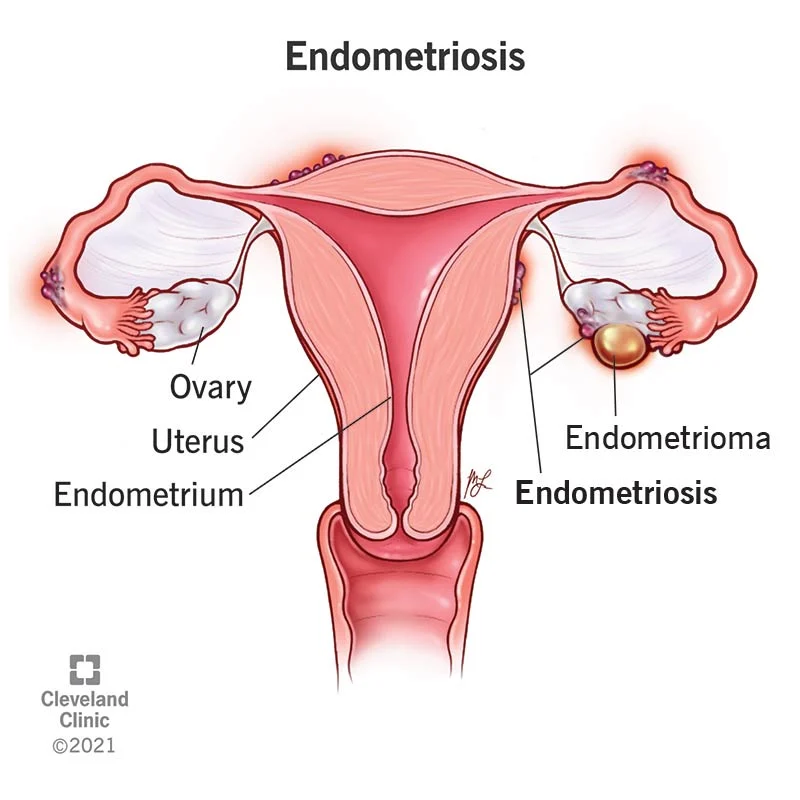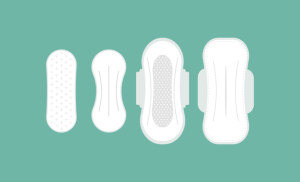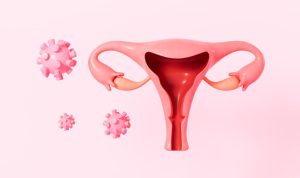Have you ever felt an ache in your lower abdomen that just won’t go away?
Do you worry that you might be suffering from Endometriosis?
If so, know that many women suffer from this menstrual disorder and it is treatable.
In this blog post, we will explore what endometriosis is, its symptoms, common treatment options, and ways for managing this condition.
We will also discuss how to find support and helpful resources as you try to understand and manage endometriosis. So, get ready to take control of your health—it’s time to learn all about endometriosis!

What is Endometriosis?
Endometriosis is a condition that affects women of reproductive age and is a common reproductive health issue. It occurs when tissue similar to the lining of the uterus grows outside of it, which can cause pain, scarring, and infertility.
Endometriosis commonly affects the ovaries, fallopian tubes, and pelvic floor muscles but can also be found in other organs such as the bladder or intestines. Symptoms vary from person to person, however, these can include pelvic pain, painful periods, back or abdominal pain, and uterine bleeding between periods.
It’s important to understand that endometriosis is a long-term condition and its severity varies from woman to woman. Therefore, it’s essential to seek help from a healthcare professional to get an accurate diagnosis as well as manage your symptoms in order to ensure you have the best quality of life possible.
What are the Symptoms and Diagnosis of Endometriosis?
Endometriosis affects up to 10% of women of reproductive age, but it can go undiagnosed for years due to its vague symptoms. It is a condition where the tissue that normally lines the inside of the uterus grows outside the uterus and causes pain, inflammation, and other symptoms. Common symptoms of endometriosis include:
1. Painful Periods
2. Abdominal Cramps
3. Lower Back Pain
4. Painful Sex
5. Bleeding Between Periods
It is important to visit your doctor if you experience any of these symptoms as they can help diagnose endometriosis and suggest treatment plans. Diagnosis is typically done via an internal examination or imaging exams such as an MRI or ultrasound.
If diagnosed with endometriosis your doctor may suggest lifestyle changes such as exercise and dietary changes, medications such as hormones or pain relievers, or surgical treatment.
Treatment Options for Endometriosis
Apart from making the heavy blood flow caused by endometriosis more manageable by using the widest sanitary pads, this disorder can also be treated.
When it comes to treating endometriosis, there are various options available. In general, the treatments can be divided into three main categories:
1. Medical Treatment
Medical treatments typically involve the use of hormones, such as birth control pills or progestins, which can help reduce the pain and inflammation associated with endometriosis. The doctor might also prescribe painkillers, such as non-steroidal anti-inflammatory drugs (NSAIDs).
2. Surgical Treatment
If these medications don’t work, surgical treatments such as laparoscopy or hysterectomy may be recommended. This type of surgery is designed to remove the affected areas of tissue in your uterus and other organs. It may provide long-term relief for some women, though it is important to note that endometriosis may return after surgery.
3. Lifestyle Changes
Finally, making lifestyle changes to reduce stress and improve overall well-being can help manage the condition. This includes eating a healthy diet that’s high in fiber and low in processed foods; exercising regularly; maintaining a healthy weight; and getting enough sleep every night.
Managing Pain and Other Symptoms of Endometriosis
One of the most common symptoms of endometriosis is pain, which can be mild to severe depending on the individual. In addition to managing the pain, there are a few other things you can do to help manage the condition. For example, staying active and exercising regularly can help keep your hormones in balance and improve your overall health.
Eating a healthy diet with plenty of fruits and vegetables may also be beneficial in reducing inflammation. Additionally, it’s important to manage your stress levels and get enough restful sleep as this will aid in controlling your symptoms.
Finally, if you’re experiencing any other symptoms such as fatigue or digestive issues, it may be useful to speak to your doctor or healthcare provider about possible treatments or lifestyle changes that could help.
Choosing Essentials extra-long sanitary pads can also help in dealing with the excessive period bleeding that you may experience.
The Impact on Fertility
Endometriosis can have a major impact on fertility, as it can cause scarring and blockages in the reproductive organs. This can make it difficult to conceive naturally. The condition is also associated with an increased risk of miscarriage and ectopic pregnancies, in which the fertilized egg implants outside of the uterus.
If you are having difficulty conceiving, your doctor may recommend treatments to help you become pregnant. These can include medications such as clomiphene citrate or gonadotropin-releasing hormone agonists, which help to regulate ovulation.
Surgery may also be recommended to remove any areas of endometriosis that are obstructing the reproductive organs. In some cases, assisted reproductive technology (ART), such as in vitro fertilization (IVF), may be necessary to achieve a successful pregnancy.
How to Get Support and Take Care of Yourself?
Managing endometriosis can be a long and difficult process, so it’s important that you have support along the way. You should talk to your doctor about any concerns or questions you have, and don’t be afraid to ask for help or advice from friends and family. There are also several support groups available for people with endometriosis that can provide valuable resources and emotional support.
It’s important to take care of yourself by making sure you get enough rest, eating a balanced diet, exercising regularly, and reducing stress levels. Taking steps to look after your physical health can help reduce the symptoms of endometriosis, improve your overall well-being, and boost your mood.
In a nutshell, endometriosis is a complex and often painful condition that can affect women of all ages. It is important to understand that suffering from endometriosis doesn’t have to be a life sentence and that there are a variety of ways to manage the condition apart from using the widest sanitary pads for utmost comfort.
Talking to your doctor about endometriosis and getting tested for possible diagnoses should be your first step in understanding and managing the condition. From there, a combination of lifestyle changes, home remedies, and medical treatments can offer relief.
Seeking support and education can also help you feel more in control of your situation and empowered to take charge of your health.







